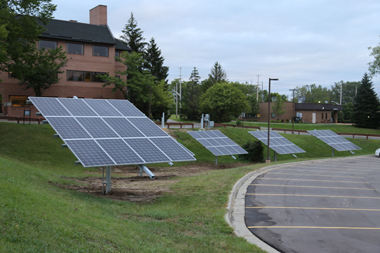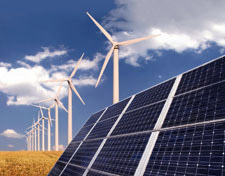Michigan residents support a transition from coal-fired power to more solar and wind energy, a new Michigan State University research report finds.
Public support of natural gas-generated electricity was more mixed, said MSU College of Engineering researchers who queried Michigan residents through a combination of interviews tapping experts, a focus group, and a survey of general public attitudes.
Ninety percent of the public said they supported more solar power use in Michigan, reported researchers Sharlissa Moore, Ph.D., assistant professor in MSU’s  James Madison College and College of Engineering and Annick Anctil, assistant professor in civil and environmental engineering in MSU’s College of Engineering.
James Madison College and College of Engineering and Annick Anctil, assistant professor in civil and environmental engineering in MSU’s College of Engineering.
The numbers softened, to 86 percent in support, when the survey questions emphasized the term construction and the term solar plant rather than the use of solar energy, the researchers wrote in a paper published by MSU’s Institute for Public Policy and Social Research (IPPSR.)
Moore and Anctil’s research combined a unique mix of in-person interviews with energy experts, a focus group discussion with the public, and cell and landline interviews conducted as part of the fall 2017 State of the State Survey (SOSS.)
The research was undertaken with support from IPPSR’s Michigan Applied Public Policy Research grant. IPPSR is a unit of the College of Social Science where it links public policy with political leadership and survey research.
At least 61 percent of the public, and 80 percent of those owning their own home, would be interested in leasing solar panels for the rooftops of their homes if solar leasing programs were “affordable and available,” the researchers found.
Some 75 percent of those responding to the State of the State survey questions strongly supported Michigan’s current plans to turn from producing 75 percent of its electricity from coal to other sources of energy in the next five years.
“As one interviewee put it, ‘The war on coal is over, and coal has lost,’” they wrote.
Moore and Anctil noted that their research focused on electrical energy rather than on fuels used in transportation as Michigan faces a shift in energy sources for residential and industrial operations in the near future.
 Existing electric infrastructure is aging, and the state has set a course to generate more energy through renewable sources. The state’s major coal-fired power plants are due to retire within the next 20 years, and nuclear generators in an even shorter time, they said.
Existing electric infrastructure is aging, and the state has set a course to generate more energy through renewable sources. The state’s major coal-fired power plants are due to retire within the next 20 years, and nuclear generators in an even shorter time, they said.
SOSS respondents supported solar energy slightly more than wind. About 86 percent of those responding to the survey favored wind. Five percent of the public strongly opposes the use of more wind energy. Three percent strongly oppose solar.
A majority, 56 percent, of those answering the State of the State Survey opposed more use of nuclear power. Of those, 22 percent were somewhat opposed and 34 percent strongly against, the researchers found. Some experts called for nuclear power to be used if it can be affordably constructed.
A slim majority of the public, 52 percent, supported nuclear power when questions were asked about construction of nuclear power plants described that are “smaller, cleaner and do not use water.”
Moore and Anctil called for the state to develop better policies to promote innovation in renewable energy and to take advantage of renewables’ promise of economic development, innovation and competitiveness.
Their research also found:
-
Most Michigan residents consider natural gas environmentally friendly, but almost half said they’d be less favorable toward the fuel if it required more fracking in the state.
-
Sixty-one percent of the SOSS respondents believe that a mix of private citizens, utility companies and leasing companies should own solar panels
-
No clear consensus on the appropriate rates for “net metering” – the amount that people who install solar panels are paid for selling excess energy to utilities.
-
Some energy experts emphasized the importance of maintaining baseload coal, nuclear, or natural gas plants that generate around-the-clock electricity, while others thought that technological innovation will make them obsolete. A majority of SOSS respondents said energy independence was important, but were more open to integrating the electricity grid with Canada and surrounding states when told the step could increase use of renewable energy.
-
Strong beliefs that Michigan has the expertise to make a successful energy transition to renewable electricity through innovation, well-managed state utility companies, research universities and skilled workers.